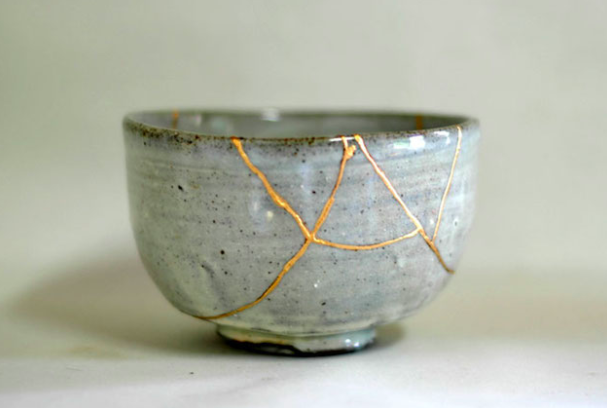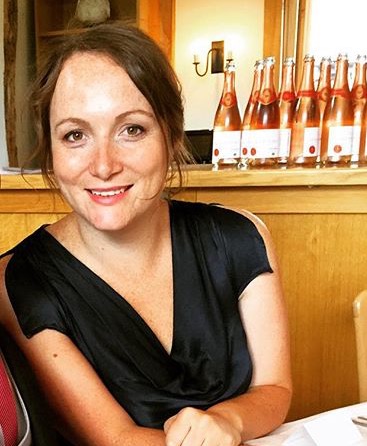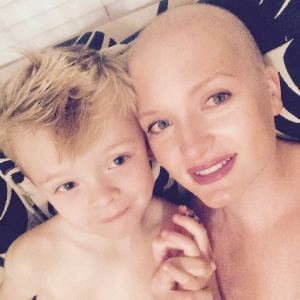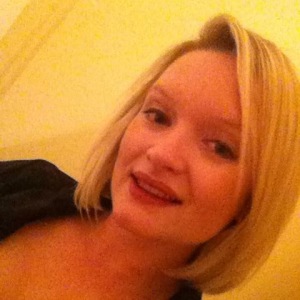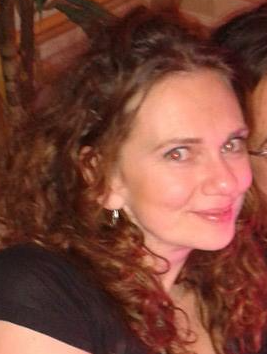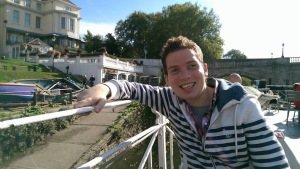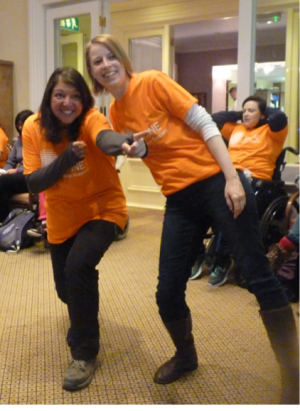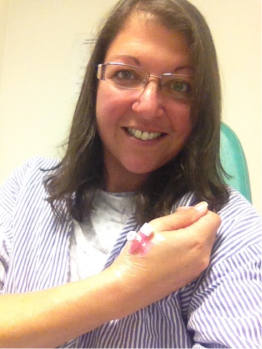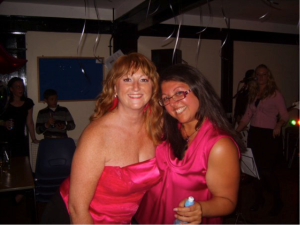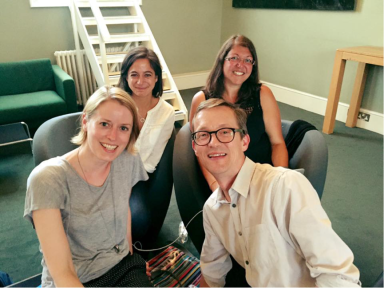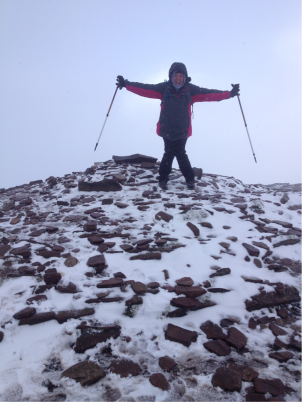Here at Shine HQ, we frequently see questions about “returning to normal” in our online groups. Young cancer patients rightly want to know when they’ll be able to get back to there they were before but, in most cases, there isn’t an easy answer. For many people we work with, we know that life doesn’t ever really go back to normal. That’s not to say that it can’t be good (or even better) than before – it’s just that something as big as a cancer diagnosis can leave you feeling changed. In our latest blog, Karen shares her thoughts on “moving on” – and explains how it relates to the Japanese art of Kintsugi!
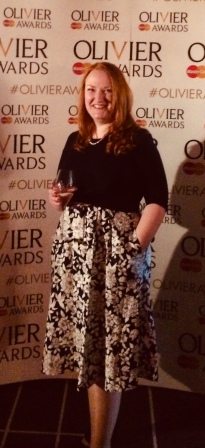
Blog author, Karen Myers
The end of active cancer treatment is a weird time. It’s all you’ve wanted since diagnosis – an end to hospital appointments, tests, treatments, side effects, surgery, pain, discomfort, feeling a little bit shit. And then, if you’re lucky, it is over. You’re told that your treatment has done it’s job, got rid of the invaders, killed those nasty cancery cells so you’re NED (No Evidence of Disease) or in remission. You’re good to go. Back to normality.
Except there’s not really a ‘normal’ after cancer. At least not the same normal as there was before. It’s a readjustment. Your energy levels, your self-confidence, your relationships, your work and social life, your body and your body image have all been knocked. With the safety net of treatment removed, you are confronted with the things cancer has left you with or taken from you. After my breast cancer surgery, which removed my entire right breast and used skin and tissue from my stomach to rebuild a new ‘foob’ (fake boob), something I’ve definitely been left with is scarring. Physical and emotional.
My physical scars are going to remind me every day, for the rest of my life, what cancer has done to my body. They’re pink and vivid, only three months after my surgery, and although I know they will fade in time, I also know they are a permanent marker of the path cancer traced across my skin and my life.
But scars don’t have to be thought of as ugly reminders of something terrible, of the price your body has paid for fighting cancer. In an attempt to see my own scars in a different light, I’ve become a bit obsessed with broken crockery and the Japanese art of ‘kintsugi’.
Kintsugi, translated as ‘golden joinery’, is focused on repairing broken items of pottery with a lacquer mixed with gold powder. By using the golden glue, those joins where the broken pieces have been put back together aren’t hidden or disguised but embraced and celebrated. Kintsugi says that the breaks, and the subsequent repair, should not be ignored, but valued as an indicator of the hard history of that item. By adding gold, that history, the cracks, the breaks and the struggle to bring about repair, make the broken item of crockery even more beautiful than before. Kintsugi recognizes the fragility of the broken piece, but also testifies to its strength by making the new bonds glow and shine, to celebrate that which is holding them together.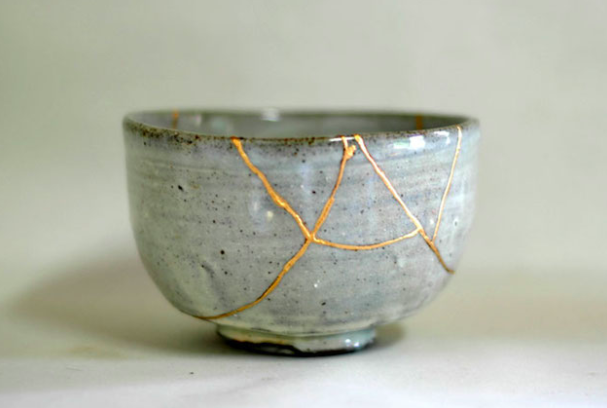
To me, this is one of the most beautiful concepts that cancer survivors can apply to themselves. Now, I’m not suggesting that everyone tattoo their surgical scars gold (although it is somewhat tempting). Instead, I’m trying to embrace the philosophy behind kintsugi as a way to accept my scars, both those visible on my skin and those hidden in my heart and mind, as evidence of both my fragility and my strength. Bodies do break and break down. The human form is fragile, even when we’re young. There’s no shame in being ill, so why should we be ashamed of the scars that mark us out as having endured? Alongside the suffering these scars, these breaks in the pottery, also show endurance, strength, resilience, determination, sheer bloody-mindedness, and, we hope, recovery. No-one asked for them but, just like a piece of kintsugi-rescued crockery, our scars are part of our cancer, and life history.
Of course, when active cancer treatment has finished, anxieties about the future still abound – we worry about the risk of recurrence, of developing secondary cancers, the impact of depleted energy resources, the possibility of resuming work and the damage done to our mental wellbeing. It’s too simplistic and insulting to assume that because we have finished treatment we can simply ‘move on’ or ‘return to normal’. But for those of us lucky enough to be officially cancer-free, the kintsugi philosophy asks us to see those emotional scars and continuing anxieties as markers of our resilience. We might not feel resilient or brave – I hated anyone telling me I was brave during treatment. I wasn’t brave. I cried and raged a lot. I got on with it because I didn’t have any choice – but the golden lacquer shows that what broke us initially was overcome. We face continuing physical and psychological challenges, but with a history of obstacles overthrown marked into our skin and our psyche. It is glued into our repaired bodies and recovering minds.
I’ve never been much of one for tattoos. But since losing my breast to cancer, I’ve been fascinated by the stunning skin-inked artwork that some women have chosen to cover their mastectomy and/or reconstruction scars. Rather than opt for nipple reconstruction or 3D nipple tattoos, these women have put their own bold, beautiful stamp on their bodies. To honour what has been lost and to shout to the world that there is beauty even in scarred and damaged tissue. For me, it seems strange that the scars I see every day will eventually be forgotten by most of the people I know, even close friends and family, because they are hidden. So I see that tattooed artwork as a contemporary body-art form of kintsugi, and it may be that is the way I reclaim my own body, my own sense of self and remind the world that I have been broken but repaired.
Moving on is always going to be hard when you bear scars. But maybe with a glint of gold in your post-cancer wounds, be it real tattoo ink or metaphorical mind-glue, you can start the process of healing and re-forming into a new, fragile but resilient, kintsugi-d you.
Karen Myers is a blogger, baker, knitter, traveller, theatre-goer and escape room addict. She was diagnosed with invasive breast cancer in July 2018 and has blogged about her experience at atozeeofbc.com.

